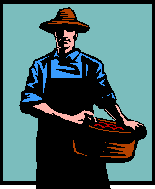Populist Revolt
 1867--Patrons
of Husbandry (The Grange) formed
1867--Patrons
of Husbandry (The Grange) formed
1873--Silver is demonitized in the "Crime of '73"
1877--Farmer's Alliance Founded
1892--People's (Populist) Party Organized
1893--Depression Begins
1896--William Jennings Bryan nominated for president by both Democrats and
Populists; William McKinley elected president.
1900--Currency Act puts U.S. on gold standard
In the late 1800s an agrarian-based popular mass revolt swept much of the country, and helped launch the electoral Populist Party. The Populist movement
of this period started out progressive, and even made some attempts to bridge racial divides between blacks and whites.
Some populist groups, however, later
turned toward conspiracism, adopting anti-Semitism, and making racist appeals.
Historian Micheal Kazin traces "two different but not exclusive strains of vision and protest" in the original
U.S.:
- the revivalist "pietistic impulse issuing from the Protestant
Reformation"; and
- the "secular faith of the Enlightenment, the belief that ordinary people could think and act rationally, more rationally, in fact, than
their ancestral overlords." "Circuit-riding preachers and union-organizing artisans agreed that high-handed rule
by the wealthy was both sinful and un-republican. All believed in the nation's millennial promise, its role as the beacon of liberty in a benighted world"
The Populists fought against giant monopolies and trusts that concentrated wealth in the hands of a few powerful families and corporations in a way that
unbalanced the democratic process. They demanded many economic and political reforms that we enjoy today. At the same time populism drew themes from several
historic currents -- with potentially negative consequences:
- Producerism--the idea that the real Americans are hard-working people who
create goods and wealth while fighting against parasites at the top and bottom
of society who rob the public--sometimes promoting scapegoating and the blurring
of issues of class and economic justice, and with a history of assuming proper
citizenship is defined by White males;
- Anti-elitism--a suspicion of politicians, powerful people, the wealthy, and
high culture--sometimes leading to conspiracist allegations about control of the
world by secret elites, especially the scapegoating of Jews as sinister and powerful manipulators of the economy or media;
- Anti-intellectualism--a distrust of those pointy headed professors in their
Ivory Towers--sometimes undercutting rational debate by discarding logic and
factual evidence in favor of following the emotional appeals of demagogues;
- Majoritarianism--the notion that the will of the majority of people has
absolute primacy in matters of governance--sacrificing rights for minorities,
especially people of color;
- Moralism--evangelical-style campaigns rooted in Protestant
revivalism--sometimes leading to authoritarian and theocratic attempts to impose
orthodoxy, especially relating to gender; and
- Americanism--a form of patriotic nationalism--often promoting ethnocentric,
nativist, or xenophobic fears that immigrants bring alien ideas and customs that
are toxic to our culture.
Main critiques made by Populists:
1. Too great an emphasis on property rights
2. Decried the existence of the monopoly
3. Denounced Social Darwinism & laissez-faire economics
4. Industrial society had turned the individual into a commodity
5. Wealth was unevenly distributed
Omaha Platform of 1892
In 1890 farmers elected 5 U.S. senators, 6 governors, and 46 congressmen. Encouraged by this, farmers again
set their sights on a national coalition. The three major farmers' organizations held a convention in Omaha,
Nebraska in 1892. They stated six principal demands:
1.A permanent union of all working classes
2.Wealth for the workers
3.Government ownership of railroads
4.Government ownership of all communications systems
5.More flexible and fair distribution of the national currency
6.No more ownership of land by those who do not actually use it
As it turned out, the Populists' secondary, less radical demands came into law within twenty
years: a secret ballot, a graduated income tax, and direct election of senators.
The Wizard of Oz and a parable on populism: http://www.halcyon.com/piglet/Populism.htm
A helpful outline of the farmer's revolt: http://www.wam.umd.edu/~jklumpp/comm460/pop.html#Alliance
 1867--Patrons
of Husbandry (The Grange) formed
1867--Patrons
of Husbandry (The Grange) formed